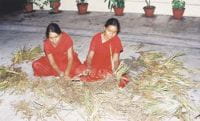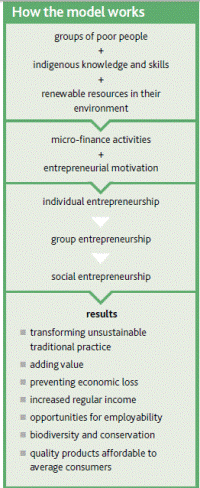‘We have not inherited the world from our forefathers but we have borrowed it from our children’. This Kashmiri proverb emphasises our responsibility to look after nature in all its diversity. Human intervention in nature has caused pollution, contributed to climate change and led to the unsustainable use and destruction of natural resources.
Excluded communities
Poor communities who are traditionally self-employed and dependent on natural resources for their livelihoods are often the worst affected by climate change and environmental degradation. Their culture is based on genuine love towards nature and they live close to nature. They are often overlooked by development organisations and government. Existing human rights provisions have not adequately covered them.
Marginalisation and market forces
In our experience, labour groups dependent on natural resources have difficulty gaining access to capital, knowledge and information, local infrastructure and facilities for processing raw materials such as herbs (pictured above) and production and marketing. The increasing availability of technology means that their labour is undervalued. As a result they often have to sell their primary products at a loss when they need income urgently. They then find it increasingly difficult to meet their basic needs such as food, health, housing, literacy and water.
Finding solutions
We need to focus on environmental sustainability, adapting to climate change, conservation and finding solutions that:
- protect the environment
- protect and develop livelihoods
- are acceptable to the people affected.
These solutions should enable poor communities dependent on natural resources to:
- protect the resources they depend on for income
- understand the market for their products
- earn a predictable income
SOLAI (Social Life Animation India) has started a new project to address the major issues in the local environment and to develop a natural resource-based livelihood model. SOLAI offers training and advice that helps individuals and groups to develop and sell products while protecting their natural resources. Micro-finance programmes create capital and SOLAI offers access to facilities for processing raw materials. The model is pictured below. It can be adapted and used by others.
RT Rajan is the Director of the SOLAI Programme.
SOLAI Programme
Christianpet
Vellore – 632 059
Tamil Nadu
India
Email: [email protected]










